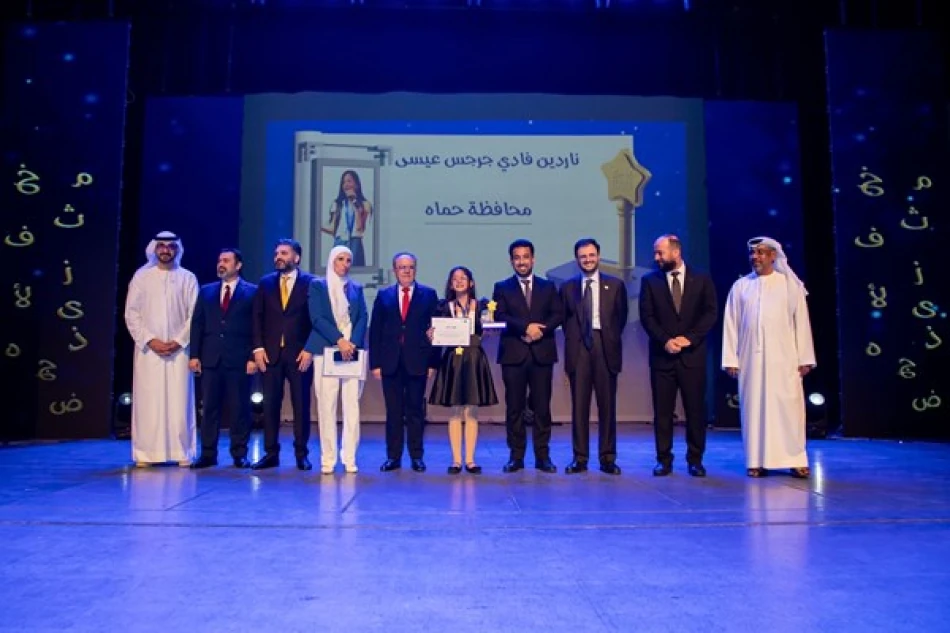
Syrian Student Aces Arab Reading Challenge, Crowned Champion in 9th Edition
Syria's Reading Champion: A Sixth-Grader Triumphs in Arab World's Largest Literary Competition
Eleven-year-old Nardeen Fadi Georges Issa has emerged as Syria's champion in the ninth edition of the Arab Reading Challenge, defeating nearly 600,000 competitors in what has become the Arab world's most significant educational initiative. Her victory represents more than academic achievement—it signals Syria's determination to rebuild its intellectual foundations despite years of conflict, while reinforcing the UAE's soft power influence across the region through cultural diplomacy.
Record-Breaking Participation Amid Regional Challenges
The competition drew 583,127 Syrian students from 5,005 schools under the supervision of 9,749 educators—numbers that would be impressive for any nation, but are particularly striking for a country still recovering from prolonged conflict. Nardeen, a sixth-grade student at the Arab Women School in Hama, stood out among this massive field of competitors.
The Damascus ceremony announcing her victory brought together Syria's highest-ranking officials, including Education Minister Dr. Mohammed Turko and Higher Education Minister Dr. Marwan Al-Halabi, alongside Dr. Fawzan Al-Khalidi from the Mohammed bin Rashid Al Maktoum Global Initiatives Foundation. This high-level attendance underscores how educational initiatives have become diplomatic priorities in the post-conflict Middle East.
Beyond the Main Prize: Recognizing Excellence Across Categories
The competition also honored Rashad Salem Ahmed as "Distinguished Supervisor" and Al-Bayan Model School as "Distinguished School." In the special needs category, ninth-grader Mohammed Turba Dar from Homs claimed first place among 220 participants, highlighting the initiative's inclusive approach.
Syria's Remarkable Track Record in Arab Literary Competition
Nardeen's victory continues Syria's impressive streak in this regional competition. Syrian students have claimed the overall Arab Reading Challenge title twice in recent years: Sham Mohammed Al-Bakour won in the sixth edition (2022), and Hatem Mohammed Jasim Al-Turkawi triumphed in the eighth edition (2024). This consistency suggests that Syria's educational system, despite infrastructure challenges, continues producing intellectually competitive students.
Education Minister Turko emphasized that this success reflects "the great interest that Syria's Ministry of Education places on encouraging students to read and compete for excellence in cognitive and cultural fields." More significantly, it demonstrates the Syrian society's commitment to "constantly improving the educational level of new generations."
The UAE's Strategic Cultural Investment
The Arab Reading Challenge, launched in 2015 under Sheikh Mohammed bin Rashid Al Maktoum's directives, represents one of the UAE's most successful soft power initiatives. This year's ninth edition attracted a record 32.231 million students from 50 countries, representing 132,112 schools—numbers that dwarf most international educational programs.
Dr. Al-Khalidi noted that Syrian students demonstrated "great passion for reading and increasing their knowledge in scientific and cultural fields," while showing "great interest in the Arabic language." This aligns with the UAE's broader strategy of positioning itself as the guardian of Arab cultural heritage while modernizing educational approaches.
Comparing Regional Educational Initiatives
Unlike Singapore's focus on STEM competitions or South Korea's emphasis on digital literacy challenges, the Arab Reading Challenge prioritizes classical Arabic literature and cultural knowledge. This approach reflects the Gulf states' investment in cultural soft power, contrasting with Western educational initiatives that typically emphasize technical skills over cultural preservation.
What This Means for Syria's Educational Recovery
Syria's continued success in this competition signals several important trends. First, it demonstrates that educational quality can persist even when physical infrastructure suffers. Second, it shows how international partnerships—in this case with UAE institutions—can provide Syrian students with opportunities for regional recognition and advancement.
The participation of nearly 600,000 Syrian students also indicates that families prioritize education despite economic hardships. This cultural commitment to learning could prove crucial as Syria works to rebuild its knowledge economy and reintegrate with regional educational networks.
The Broader Implications for Arab Educational Cooperation
The competition's success reflects growing educational cooperation between Gulf states and traditional Arab intellectual centers like Syria and Egypt. As the UAE positions Dubai as a regional hub for education and culture, initiatives like the Arab Reading Challenge create networks that extend Emirati influence while providing genuine educational benefits to participating countries.
For investors and policymakers, this trend suggests opportunities in educational technology, Arabic-language learning platforms, and cultural exchange programs. The consistent participation numbers indicate sustained demand for Arabic-language educational content and regional competition platforms.
Nardeen's victory, while celebrating individual achievement, ultimately represents the resilience of Arab educational traditions and the potential for cultural diplomacy to create meaningful connections across a often-fragmented region. Her success story will likely inspire similar initiatives and reinforce the value of investing in Arabic-language education and cultural preservation programs.
Most Viewed News

 Layla Al Mansoori
Layla Al Mansoori






